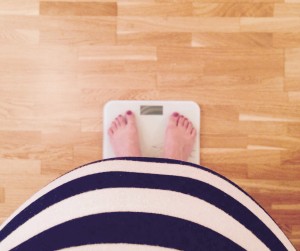Eating for Two. Healthy Weight Gain During Pregnancy.
 “Well, I’m eating for two now, so I should really have just one more serving…” When you’re pregnant, the temptation to splurge on extra servings, or give-in to unusual cravings as your belly expands, can be easy. You’re gaining weight anyway. Who’s to say any one pound should be attributed to your meals and not to baby’s growing size?
“Well, I’m eating for two now, so I should really have just one more serving…” When you’re pregnant, the temptation to splurge on extra servings, or give-in to unusual cravings as your belly expands, can be easy. You’re gaining weight anyway. Who’s to say any one pound should be attributed to your meals and not to baby’s growing size?
The truth, however, is that regulated weight gain from high quality foods and a defined nutrition plan is critical to a healthy pregnancy, and a healthy newborn. Weight gained from sugary, fried, or processed foods, on the other hand, is not, regardless of how comforting they taste, or how easy it is to justify with the phrase, “But I’m eating for two.” Read on to learn how much weight you should gain during your pregnancy, and why it’s important to maintain a healthy weight strategy.
Healthy Weight, Healthy Baby, Healthy Mommy.
According to the Centers for Disease Control and Prevention (CDC), studies show that only 32 percent of women gain their recommended amount of weight during their pregnancy. Nearly half (48 percent) gain too much, and 21 percent don’t gain enough.
Women who do not gain enough weight during pregnancy are at risk of giving birth to an undersized infant. Babies born too small may experience such health complications as difficulty breastfeeding, developmental delays, or they may be at an increased risk of illness. Babies born to underweight women may even be born premature, which can lead to additional health complications. For moms, women who do not gain enough weight during pregnancy are at risk of anemia, or developing osteoporosis later in life.
Women who gain too much weight, also put both themselves and their babies at risk of health complications. Women who gain too much weight are at risk of delivering over-sized babies which may require a cesarean section, or escalate over time into childhood obesity. Babies born of overweight women are also at risk of being born premature.
Women who gain too much weight during pregnancy may face such health complications as gestational diabetes, or preeclampsia. They often also experience difficulty losing the extra weight. As a result, after baby is born they may experience their own health complications related to obesity, such as diabetes or high blood pressure.
How Much Weight Should You Gain During Your Pregnancy?
There is no fixed amount of weight that each woman should gain during her pregnancy. Rather, the amount is assessed based on your pre-pregnancy body mass index (BMI). Typically, women with an underweight BMI should gain 28 to 40 pounds during pregnancy. Women with a normal BMI should gain 25 – 35 pounds during pregnancy, women with an overweight BMI should gain 15 -25 pounds, and women whose BMI indicates they are obese should only gain 11 – 20 pounds.
How Many Extra Calories Do Pregnant Women Need.
The number of extra calories pregnant women need is less than you’d expect. You only need about 300 extra calories per day for the healthy development of your baby—an amount that is likely much less than that extra serving of ice cream, chips, or your other favorite comfort food.
Not only is the number of extra calories you consume important, so is the source of those calories. Your extra calories should come from lean proteins, fibers, grains, and healthy fats, not sugary carbohydrates or trans fats.
How to Develop a Healthy Weight Gain Plan.
Your OBGYN will work with you to put a healthy nutrition plan in place, based on your individual needs and health history. He or she will also weigh you at every visit to help track your progress and make adjustments to your nutrition strategy throughout your pregnancy if more weight needs to be gained or lost.
If you have questions about your weight or the health of your baby at any point throughout your pregnancy talk to your OBGYN. He or she will help you and your baby create and maintain a healthy plan from months one through nine. And if you are newly pregnant and live in the Western New York area, consider Chouchani, Sayegh and Robinson for all of your prenatal care. We are currently accepting new patients.
